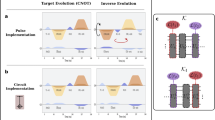Abstract
The problem of initializing phase in a quantum computing system is considered. The initialization of phases is a problem when the system is initially present in a superposition state as well as in the application of the quantum gate transformations, since each gate will introduce phase uncertainty. The accumulation of these random phases will reduce the effectiveness of the recently proposed quantum computing schemes. The paper also presents general observations on the nonlocal nature of quantum errors and the expected performance of the recently proposed quantum error-correction codes that are based on the assumption that the errors are either bit-flip or phase-flip or both. It is argued that these codes cannot directly solve the initialization problem of quantum computing.
Similar content being viewed by others
REFERENCES
D. Deutsch, “Quantum computational networks,” Proc. R. Soc. Lond. A 425, 73 (1989).
D. P. DiVincenzo, “Two-bit gates are universal for quantum computation,” Phys. Rev. A 51, 1015 (1995).
A. Ekert and R. Jozsa, “Quantum computation and Shor's factoring algorithm,” Rev.Mod. Phys. 68, 733 (1996).
N. A. Gershenfeld and I. L. Chuang, “Bulk spin-resonance quantum computation,” Science 275, 350 (1997).
L. K. Grover, “Quantum mechanics helps in searching for a needle in a haystack,” Phys.Rev. Lett. 79, 325 (1997).
S. Kak, “Quantum information in a distributed apparatus,” Found. Phys. 28, 1005 (1998).
S. Kak, “On initializing quantum registers and quantum gates,” LANL e-print quant-ph/ 9805002 (1998).
L. D. Landau and E. M. Lifshitz, Quantum Mechanics (Pergamon, Oxford, 1977), p. 7.
M. B. Plenio and P. L. Knight, “Decoherence limits to quantum computation using trapped ions,” LANL e-print quant-ph/9610015 (1996).
J. Preskill, “Fault-tolerant quantum computation,” LANL e-print quant-ph/9712048 (1997).
P. W. Shor, “Scheme for reducing decoherence in quantum computer memory,” Phys.Rev. A 52, 2493 (1995).
P. W. Shor, “Fault-tolerant quantum computation,” LANL e-print quant-ph/9605011 (1996).
P. W. Shor, “Polynomial-time algorithms for prime factorization and discrete logarithms on a quantum computer,” SIAM J. Computing 26, 1474 (1997).
A. M. Steane, “Error correcting codes in quantum theory,” Phys. Rev. Lett. 77, 793 (1996).
Rights and permissions
About this article
Cite this article
Kak, S. The Initialization Problem in Quantum Computing. Foundations of Physics 29, 267–279 (1999). https://doi.org/10.1023/A:1018877706849
Issue Date:
DOI: https://doi.org/10.1023/A:1018877706849




